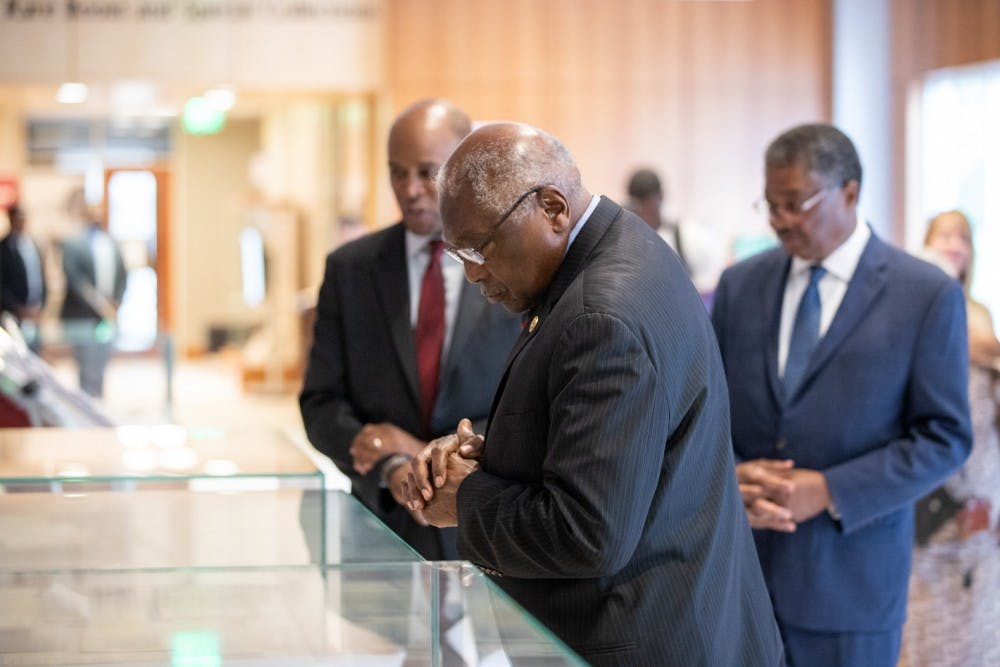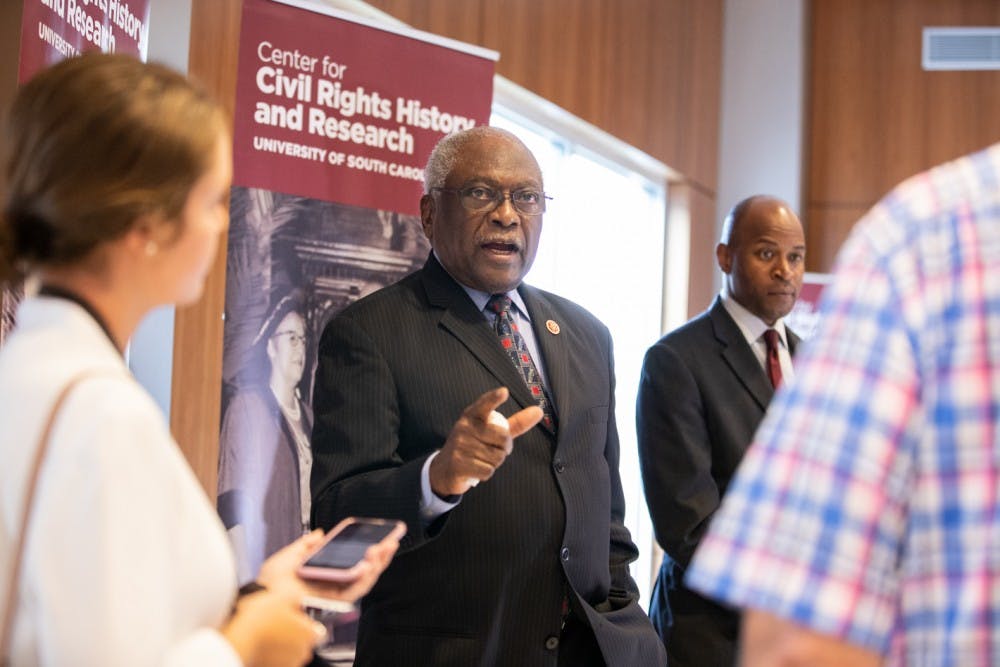Rep. Jim Clyburn toured the Justice For All exhibit at USC ahead of its conclusion this Friday. Hundreds of items on display document the civil rights movement in South Carolina and its national impact.
In the exhibit are newspaper articles, photographs and handwritten letters discussing school desegregation, mass demonstrations, sit-ins and boycotts, the Orangeburg Massacre and more. One item, in particular, is a ticket to see Malcolm X speak at the Township Auditorium in 1963 and another is a 1955 article by U.S. News & World Report titled, "Separate Schools Or Else," detailing the response in Sumter after a Supreme Court ruling against segregated schools.
Clyburn, House majority whip and third-ranking Democrat, also has a section at the exhibit dedicated to his efforts in the civil rights movement in the 1960s. At 12, Clyburn was elected president of the Sumter NAACP youth chapter. As he grew older, he organized marches and was also jailed during the movement while he was a student at South Carolina State University.
The Justice For All exhibit is on display in the Ernest F. Hollings Special Collections Library and Clyburn said this location had a special meaning to him, considering his friendship with Hollings. Clyburn was visibly emotional when he recounted his speech at Hollings' funeral, which he began with, "Thank God, a man can change."
Clyburn said he started the speech that way because of Hollings' early record of being against civil rights and how he transformed into a civil rights supporter. On display in the exhibit is a newspaper article which reads Hollings testified before both House and Senate subcommittees opposing all civil rights bills.
Clyburn mentioned the late Matthew Perry, a civil rights attorney who defended the NAACP from a lawsuit in Sumter, and how his mother took him to see the defense when he was a child.
Clyburn said his mother said to him on the way to the courthouse, "I want you to see what you can be when you grow up."
Clyburn said although Perry lost the case, he won the hearts and minds of both African American and white South Carolinians. As he began his career as a teacher, he was sent to Carver High School in Spartanburg, right across the street from Perry's law firm. Perry and Clyburn would sit on the porch of the law firm and developed a relationship based on their dreams and goals for the civil rights movement.

Before Clyburn ended his public speech at the exhibit, he recounted a walk he had with his daughter in Ghana at The Door of No Return, the spot where millions of Africans walked and took one last look at Africa before they were shipped to Brazil, the United States and the Caribbean as slaves. Clyburn then led into why USC is important in teaching the history of the civil rights movement, saying South Carolina is the most historical state and that USC impacted the civil rights movement greatly by accepting the first African American students.
"This university is important ... Let's get it right, our children, our grandchildren deserve it," Clyburn said.
Columbia resident Ramelle Brooks brought his children to the exhibit to expose them to the civil rights movement, how it shaped the past and how it can impact their present life. Brooks said his son recognized the civil rights leaders' faces in the pictures and documents on display and matched them with some of those who attended the exhibit and noticed a "spark" on his son's face when the leaders said, "That is me."
Although Brooks said he initially thought it might be difficult for his children to understand the history, he was impressed that it resonated with them.
"They may not comprehend the level of hate, hatred or animosity of the era, that's something that they don't, but they definitely see the issues during the time," Brooks said.
Bobby Donaldson, Center for Civil Rights History and Research director and history professor, helped put together the exhibit with items from USC's collection. Donaldson said it was fitting for Clyburn to visit the exhibit because of his deep roots in the NAACP, growing up as a civil rights leader in South Carolina and how he brings those experiences and perspectives to the nation's capital.
"I think part of what he does now as a national leader, he brings that history with him and it's echoed in this exhibit," Donaldson said.

